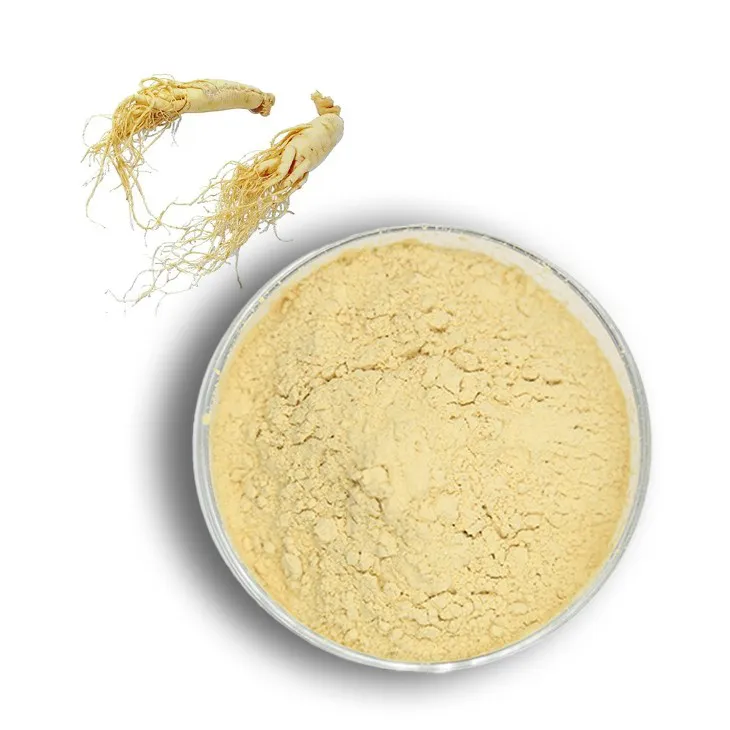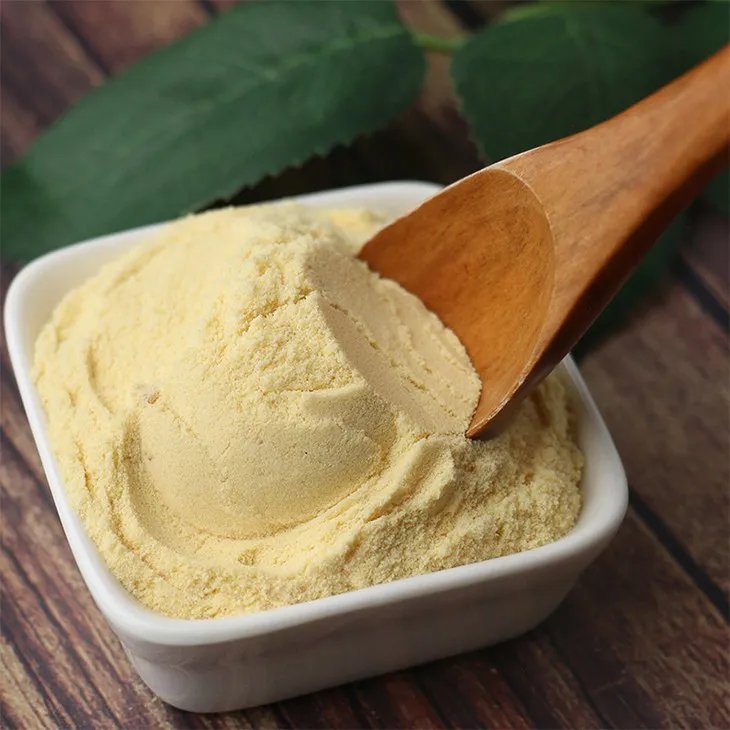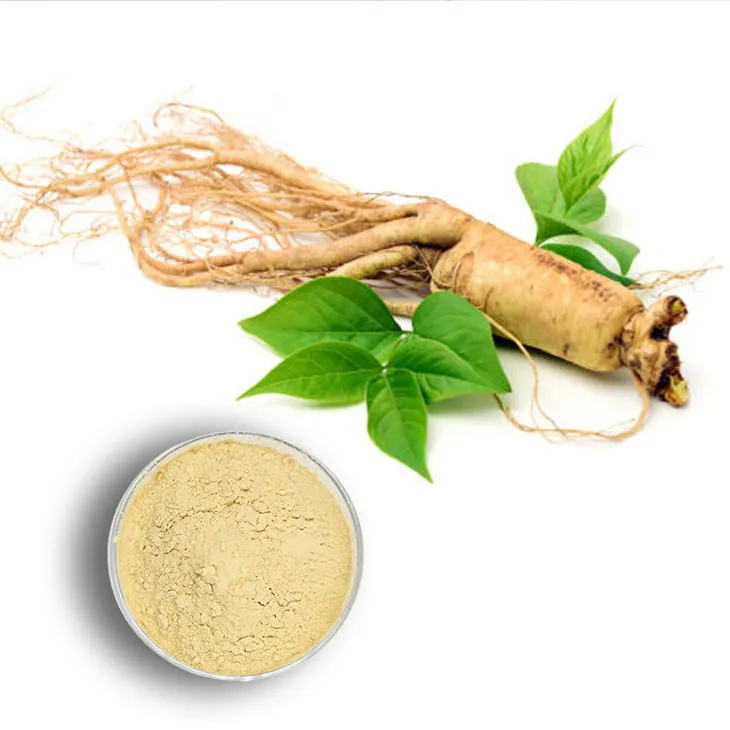- 0086-571-85302990
- sales@greenskybio.com
Active components in ginseng root extract.
2024-11-26

Introduction
Ginseng Root Extract has been highly regarded in traditional medicine for centuries. It is known for its numerous health - promoting properties. The active components within it are the key factors contributing to these beneficial effects, making it a subject of extensive scientific research.

Ginsenosides: The Most Studied Active Components
Ginsenosides are steroid - like compounds that have been the focus of a great deal of research. They play a significant role in influencing various physiological processes in the human body.
Stress Reduction and Neurotransmitter Regulation
One of the important functions of ginsenosides is their potential to regulate neurotransmitter release. For example, they can affect the levels of neurotransmitters such as serotonin and dopamine. By modulating these neurotransmitters, ginsenosides are related to stress reduction and can contribute to mental well - being. In modern society, stress is a common problem, and substances that can help the body better cope with stress are highly sought after. Ginsenosides offer a natural way to potentially address this issue.
Other Physiological Effects
Ginsenosides also have other physiological effects. They may have antioxidant properties, which can help protect cells from damage caused by free radicals. Additionally, they may play a role in regulating blood sugar levels. In some studies, it has been suggested that ginsenosides could be beneficial for people with diabetes or those at risk of developing diabetes. They may also influence blood lipid profiles, potentially helping to reduce the risk of cardiovascular diseases.

Polysaccharides: Immune - Stimulating Macromolecules
Polysaccharides in Ginseng Root Extract are macromolecules with important functions.
Immune System Activation
These polysaccharides can stimulate the immune system by activating immune cells. They can enhance the function of macrophages, which are key cells in the body's immune defense. Macrophages are responsible for engulfing and destroying foreign invaders such as bacteria and viruses. By activating macrophages, polysaccharides in Ginseng Root Extract can help the body better resist infections. Moreover, they may also play a role in modulating the immune response, preventing the immune system from over - or under - reacting.
Potential Anti - Tumor Effects
Some research has also suggested that ginseng polysaccharides may have potential anti - tumor effects. They may enhance the body's immune surveillance against cancer cells, helping the immune system to recognize and destroy cancer cells more effectively. However, more research is needed to fully understand the mechanisms underlying these potential anti - tumor effects and to determine the clinical applications.

Volatile Oils: Contributing to Aroma and Pharmacological Effects
Volatile oils are also part of the active ingredients in ginseng root extract.
Unique Aroma
They contribute to the unique aroma of ginseng. This aroma is not only characteristic of ginseng but may also play a role in its traditional use. In some traditional medicine practices, the aroma of herbs is believed to have certain therapeutic effects. The volatile oils in ginseng may also be involved in this aspect.
Pharmacological Effects
In addition to contributing to the aroma, volatile oils may have certain pharmacological effects. For example, they may have anti - inflammatory properties. Inflammation is a common process in many diseases, and substances with anti - inflammatory effects can be useful in treating or preventing these diseases. However, the exact mechanisms of action of the volatile oils in ginseng root extract regarding pharmacological effects need further investigation.

Amino Acids and Trace Elements: Maintaining Physiological Functions
Amino acids and trace elements in ginseng root extract also play a role in maintaining normal physiological functions.
Amino Acids
Amino acids are the building blocks of proteins. In ginseng root extract, the presence of various amino acids is important for the body. Some amino acids are essential, meaning they cannot be synthesized by the body and must be obtained from the diet. Ginseng root extract can be a source of these essential amino acids. They are involved in processes such as protein synthesis, which is crucial for the growth, repair, and maintenance of tissues in the body.
Trace Elements
Trace elements in ginseng root extract, such as zinc, selenium, and iron, are also essential for normal physiological functions. Zinc is involved in immune function, wound healing, and DNA synthesis. Selenium is an antioxidant and is important for thyroid function. Iron is necessary for the formation of hemoglobin, which is responsible for carrying oxygen in the blood. The presence of these trace elements in ginseng root extract makes it a valuable natural resource for maintaining overall health.

Conclusion
In conclusion, the active components in ginseng root extract, including ginsenosides, polysaccharides, volatile oils, amino acids, and trace elements, are of great significance. Each component has its own unique functions, which together contribute to the many health - promoting properties of ginseng. Ginseng root extract is indeed a valuable natural resource worthy of in - depth study. Future research should focus on further elucidating the mechanisms of action of these active components and exploring their potential applications in the prevention and treatment of various diseases.
FAQ:
What are the main active components in ginseng root extract?
The main active components in ginseng root extract include ginsenosides, polysaccharides, volatile oils, amino acids and trace elements. Ginsenosides are steroid - like compounds that can influence physiological processes. Polysaccharides can stimulate the immune system, volatile oils contribute to the aroma and may have pharmacological effects, and amino acids and trace elements play a role in maintaining normal physiological functions.
How do ginsenosides in ginseng root extract affect the human body?
Ginsenosides in ginseng root extract can affect the human body in various ways. For example, they may regulate neurotransmitter release, which is related to stress reduction and mental well - being.
What is the role of polysaccharides in ginseng root extract?
The polysaccharides in ginseng root extract are macromolecules that can stimulate the immune system by activating immune cells.
Do the volatile oils in ginseng root extract have any pharmacological effects?
Yes, the volatile oils in ginseng root extract are part of the active ingredients. They contribute to the unique aroma of ginseng and may have certain pharmacological effects.
How do amino acids and trace elements in ginseng root extract contribute to human health?
Amino acids and trace elements in ginseng root extract play a role in maintaining normal physiological functions.
Related literature
- Analysis of Active Components in Ginseng Root Extract and Their Pharmacological Activities"
- "Ginseng Root Extract: A Review of Active Components and Their Therapeutic Potential"
- ▶ Hesperidin
- ▶ citrus bioflavonoids
- ▶ plant extract
- ▶ lycopene
- ▶ Diosmin
- ▶ Grape seed extract
- ▶ Sea buckthorn Juice Powder
- ▶ Beetroot powder
- ▶ Hops Extract
- ▶ Artichoke Extract
- ▶ Reishi mushroom extract
- ▶ Astaxanthin
- ▶ Green Tea Extract
- ▶ Curcumin Extract
- ▶ Horse Chestnut Extract
- ▶ Other Problems
- ▶ Boswellia Serrata Extract
- ▶ Resveratrol Extract
- ▶ Marigold Extract
- ▶ Grape Leaf Extract
- ▶ blog3
- ▶ blog4
-
Chinese Withania somnifera Extract Factory.
2024-11-26
-
中国松树皮提取物粉粉末供应商
2024-11-26
-
High - quality Marigold Extract Products.
2024-11-26
-
100% Pure Natural Mango - Flavored Powder.
2024-11-26
-
Licorice Root Extract Powder
2024-11-26
-
Bilberry Extract
2024-11-26
-
Clove Powder
2024-11-26
-
Panax Ginseng Leaf Extract
2024-11-26
-
Nettle leaf extract
2024-11-26
-
Quercetin
2024-11-26
-
Rosemary extract
2024-11-26
-
Mulberry Extract
2024-11-26
-
Hericium erinaceus extract powder
2024-11-26
-
Lemon Extract
2024-11-26





















